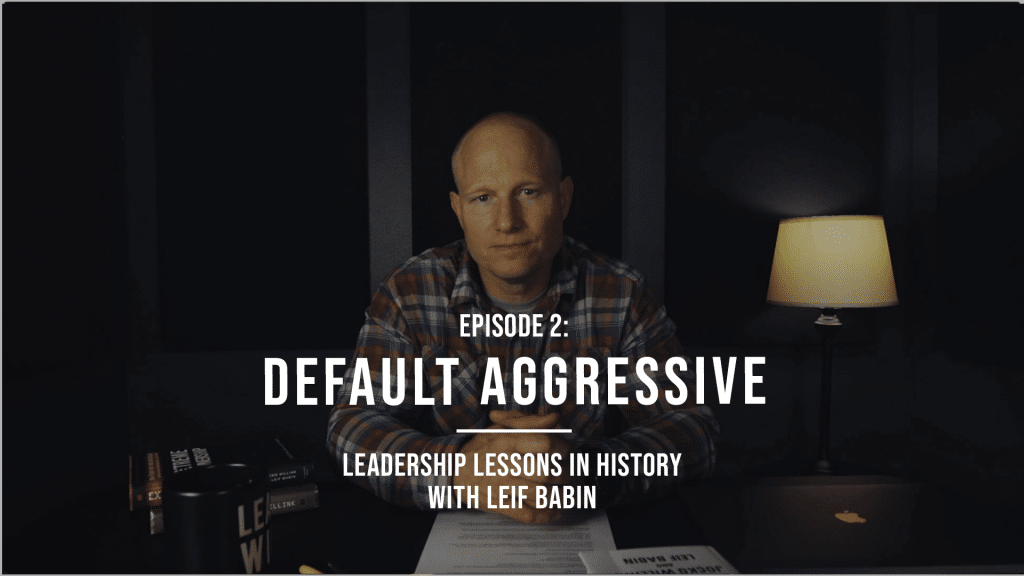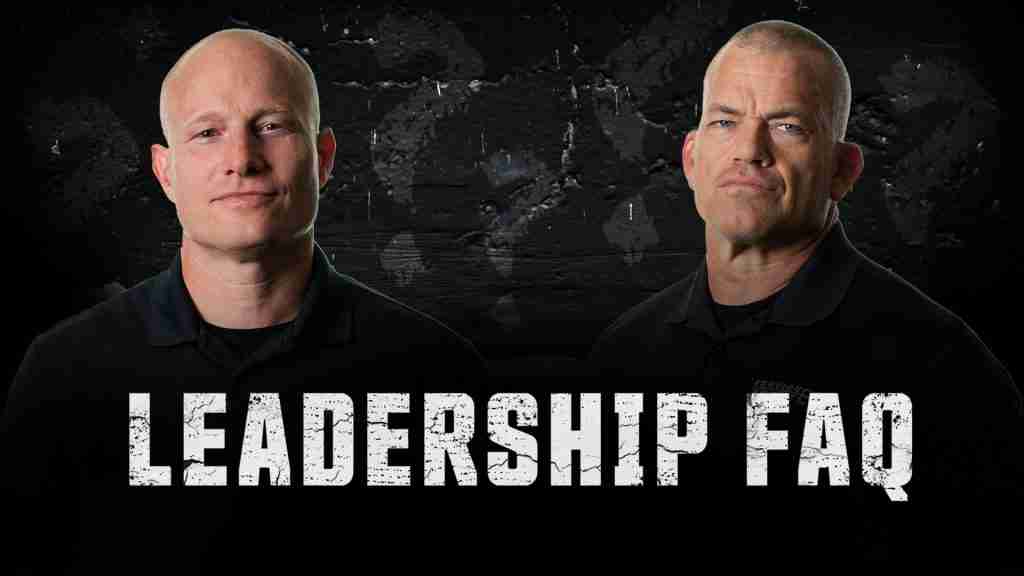“Default aggressive means that you’ve got to get aggressive to go make things happen.”
(00:08):
Christmas 1776, George Washington and the Continental Army are in retreat and they have suffered a series of defeats and things are looking terrible for the American revolution. It’s pretty much all but lost at this point. And what does Washington do on Christmas day, 1776? He goes on the attack. He gets default aggressive and he scores a victory that helps boost morale and keep the American revolution alive. And once again, leadership provides so many lessons that we can look at. We can examine decisions that were made, we can examine challenges that leaders of the past were up against, and we can extract those lessons and apply them directly to leadership challenges that we face today. So just to set the stage, so you understand just how bad things were going for Washington and the Continental Army at the Battle of Long Island in August of 1776, they had been absolutely crushed by the British.
(01:07):
The British had used a flaking maneuver, had maneuver behind them and they barely escaped from that with 9,000 troops. They suffered a series of defeats at Harlem Heights, at white Plains, and then Fort Washington with about 3000 troops defending it fell to the British. And all 3000 of those troops were captured. Washington had a total of about 14,500 troops defending New York and the British completely pushed the Continental Army out and took over the city of New York. And from those 14,500 troops in total that had defended New York after these series of defeats Washington retreats across New Jersey. And in November of 1776, he only has about 5,000 troops left. So in November and December, as Washington and his 5,000 troops that remain are retreating across New Jersey, they’re being chased by British forces, along with their Hessian allies. And the Hessians were German soldiers that were fighting on behalf of the British.
(02:10):
And so as they retreat across New Jersey, there are defections that are happening by New Jersey militia that are going over to the loyal aside. Those that actually support the British. And there are citizens of New Jersey that are actually signing petitions that they will actually support the king and the British over the Americans. To illustrate just how bad things are, the Continental Congress abandoned Philadelphia and went to Maryland because they feared that the British would actually take Philadelphia. So things are looking terrible. And Washington was able to cross the Delaware on December 7th of 1776. And he confiscated the boats that the British would need in order to cross the Delaware. So he took his army, he got across the river just ahead of the British and Hessian forces. And because they confiscated the boats, the British weren’t able to follow. So they left a series of garrisons across New Jersey.
(03:05):
And the main effort of British forces went back to winter quarters in New York. The British were so confident in their victory that a number of soldiers had written homes saying that the war was over. And Thomas Paine in The American Crisis captured just how dire things were for America. And he knew these enlistments were up for Continental soldiers. He knew that he had to inspire Americans to continue to fight even through these dark times. And so he wrote in The American Crisis this now famous quote, “These are the times that try men souls. The summer soldier and the sunshine patriot will in this crisis shrink from the service of his country. But he that stands it now deserves the love of thanks of man and woman.” The morale of the Continental Army really could any lower at this point. So Washington knows that he has got to get a victory.
(04:05):
He’s got to get a victory to show his troops and to show the rest of the American citizens that we actually can take on the British and we can be successful. That’s what his goal is. And he goes default aggressive to go on the attack. So on Christmas Eve, December 24th, 1776, he and about 2,400 of his troops crossed the frozen Delaware river. And they have to break the ice in order to get their boats across the river. And this is in the middle of a major snowstorm, a nor’eastern. I lived up in the Northeast for several years and a nor’eastern is no joke when a big storm comes in like that and there’s snow and there’s wind hauling, that’s severe weather. So this is weather that the Hessian garrison of Trenton was not expecting an attack in, and they curtailed their patrols as a result.
(04:56):
So it presented an opportunity for Washington to make that attack because of the severity of the weather. Even still, there are accounts of bloody footprints in the snow as men marched nine miles through this snowstorm in order to reach Trenton. And he received a message via courier from General Sullivan, one of his generals, that said their powder was wet. And what that meant in the days of flintlock muskets was that they couldn’t actually use their weapons because the powder was wet. Washington sends a message back to General Sullivan. It says, “Tell General Sullivan to use the bayonet. I am resolved to take Trenton.” Washington knew that this had to happen. They were desperate. This is the victory that they need. So they marched that nine miles in the snowstorm. They used the bayonets and they attacked that Hessian garrison. And they caught that Hessian garrison unprepared.
(05:50):
The garrison had not sent out patrols as they normally would because of the severity of the snowstorm. And there’s a long standing myth of the American revolution that the Hessians were drunk, that they were celebrating Christmas. And that’s actually fictional. That’s not true. As far as we can tell, most historians agree that the Hessians were simply tired and worn out. They hadn’t slept. They’ve been harassed by New Jersey militia, by attacks that had come from the Continental Army crossing the river. And that they just simply were not prepared to be attacked during this severe snowstorm, this nor’eastern that they were enduring. So they were caught off guard and it was a total victory for the Continental Army. There were 22 Hessian killed, 83 wounded and over 800 that were captured. This was a pretty minor tactical victory compared to the massive battle of the Battle of Long Island where 9,000 troops fled and were defeated by 20,000 British and Hessian troops.
(06:55):
So tactically speaking, this is pretty minor. And yet strategically speaking, this battle may have been the most important battle in the entire revolutionary war. And the reason is because Washington understood just how desperately America needed a victory. He went default aggressive to achieve that victory. And once he captured that garrison, they captured some major supplies that also were much needed by the Continental Army. They marched back nine miles in the snowstorm and they crossed the frozen Delaware once again. And this was a major turning point in the war demonstrating to those continent army troops that they could in fact defeat the British when they went on the attack. And that enabled Washington to convince his troops to continue their enlistments to recruit other troops. And it actually emboldened Americans across the colonies to actually continue the revolution and to fight against the British. And the war would continue on for another seven or eight years.
(07:56):
And this was a lengthy war. But this as really the turning point in the war to show the Americans that they could stand and defeat the British and their Hessian allies in the war for independence. This concept of default aggressive is a very powerful one. Default aggressive means that you’ve got to get aggressive to go make things happen. You can’t just sit back and wait for the good deals to fall in your lap. You got to be proactive. And when we talk about default aggressive , we got to make clear that we’re not talking about being aggressive toward people. We’re not talking about yelling and screaming at people or losing your cool. When you get emotional about things, that’s actually a sign of weakness. That’s showing that you have allowed things to actually get under your skin to get emotional.
(08:43):
And Washington was classic for being a stoic when it came to maintaining his demeanor and his professionalism. So we’re not talking about being aggressive toward people. We’re talking about being aggressive toward accomplishing the mission, overcoming challenges, overcoming obstacles, making things happen in order to lead your team to be successful in their mission, whatever that is they’re trying to accomplish. This is an example of where Washington got default aggressive. And being aggressive, particularly in the midst of hardship, in this horrible snowstorm where the Hessians weren’t being… they weren’t anticipating that an attack was going to come. They were caught off guard. And so that enabled the Americans to take advantage of that opportunity. And when you get default aggressive on things, you can take advantage of opportunities. In the Battle of Ramadi, we were able to go into enemy controlled areas when the enemy wasn’t expecting us to be there because Americans had not been able to penetrate into those areas previously.
(09:44):
So that gave us an advantage when we could catch the enemy off guard. And it’s the same thing with companies that we work with. When they get default aggressive, when they see a market opportunity, if there’s a market downturn and there’s hardship created for all the companies in a particular industry, well, that creates an opportunity. If you can figure out a way to actually overcome those challenges and obstacles, that gives you a great advantage by being default aggressive. And it’s the same thing. If there’s a particular service or product that is presenting some challenges, when a company figures out a way to solve that problem, to get a particular problem solved when it’s hard for other people to do it, that creates an opportunity for that company to be highly successful in that effort. And it can be a total game changer in an industry that can really set the bar for a new industry’s standard when a company can achieve that.
(10:38):
Just as Washington saw for his troops when he got default aggressive and won that victory on Christmas day at Trenton. So think about this concept, default aggressive, and how it applies to you. Where can you get default aggressive to solve a challenge, to overcome an obstacle, to go out and build a relationship, to do some research into an area where you can actually move into a new market area, a new sector, or create a product or service that can actually make things happen and give you an advantage? There are times in the business world as well where you simply need a victory. Where morale is down, where the team maybe just is not confident in the fact that they can actually turn a downward trend around. Whether it’s several months of missing numbers or a couple of off quarters, that’s where you got to step up and get default aggressive to achieve a victory.
(11:29):
And it might seem like a minor tactical victory, but if you can hit some numbers, if you can show some success, you can show your team, you can show self, you can show your leadership, you can show your entire organization that you actually can win. And those wins, even if they’re a minor tactical victory can be a huge strategic victory when it comes to turning around performance, boosting morale, and actually changing the entire momentum of a team to get them back on the path to success. So this is where default aggressive applies. The good deals aren’t going to come to you. The numbers are not just going to produce by themselves. You got to go out there and make things this happen. And you got to get default aggressive, get proactive to get out there and produce some victories for yourself, for your team and for your mission.










